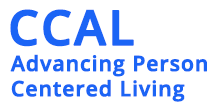Mission: CCAL was a non-profit national advocacy and education organization whose mission was to raise awareness about and advocate for the widespread implementation of person-centered living values and practices. Since 2011, CCAL focused on a marginalized and stigmatized elder population – people living with dementia, including Alzheimer’s and those who care about them.
Vision: Connect-Communicate-Collaborate by serving as a national convener and facilitator of collaborative efforts that foster and advance the exchange of ideas and issues for person-centered living values and practices to enhance well-being and the quality of life.
CCAL’s Principles of Person-Centered Living:
• Every elder and individual with a disability is provided choice, privacy, dignity, respect, independence, and autonomy.
• Elders and individuals with disabilities have the right to determine their HCBS needs, decide how best to have those needs met, and to be provided a means to give feedback about the quality and nature of the services and supports.
• A person-centered culture is nurturing, empowering, and respectful, and optimizes the well-being of not only the elder and individual with a disability, but also the family and larger caregiving and/or services and support network.
Values:
• A philosophy of “Nothing about me without me” so that the needs, interests and preferences of people living with dementia direct and inform policy making, practices, and research.
• Greater good can be accomplished through collaborative efforts – finding common ground that is reasonable and realistic.
• Integrity, transparency, and diversity of people and perspectives are essential to productive and effective efforts.
Goals:
• To strengthen the voice and involvement of people living with dementia and their care partners in advocacy efforts.
• To advocate for linking research, policy and practice in ways that will advance person-centered living practices.
• To convene and facilitate collaborative efforts for idea and issue exchanges among diverse stakeholders.
• To identify needs and gaps in policy, practices, and research and work to collaboratively develop viable solutions to address them.
• To monitor and respond to national issues that affect people living with dementia and their care partners’ choices and rights.
• To ensure that the organization is financially secure, well managed and successful in achieving its annual goals.
Background:
CCAL was founded in 1995 as the Consumer Consortium on Assisted Living, the only national assisted living consumer organization. Recognized by the IRS as a 501 (c)3 tax-exempt organization, CCAL became the nationally recognized voice of consumers of assisted living.
Almost a decade ago, the organization broadened CCAL’s purview to include all settings of services and supports for elders and narrowed the focus to advocating for person-centered living to achieve quality outcomes. Person-centered principles and practices are recognized by the World Health Organization and the Institute for Medicine as the best and the foundation for achieving quality outcomes.
CCAL decided to modify their name to align with a broader mission. Because CCAL was so widely known as “CCAL”, they kept the acronym and added the descriptor ‘Advancing Person-Centered Living’ to create its current name: CCAL-Advancing Person-Centered Living.
CCAL’s board of directors and advisory board represent a broad range of expertise, experiences and perspectives, and include consumers, consumer advocates, public policymakers, assisted living staff, health professionals, and researchers. This diversity of perspectives helps ensure that CCAL’s policies and positions are relevant and well-informed to ensure its efforts are meaningful and realistic.

